
Alan Bean with Kent McKeever
By Alan Bean
This Wednesday Bill Jones and traveled to Waco to visit with Joel Gregory, the former pastor of First Baptist Church, Dallas who, though white as white can be, spends a lot of time preaching to African American preachers. After a delightful lunch in the faculty dining room at Baylor, we also dropped in on Kent McKeever, an immigration attorney who works with Mission Waco. Kent was wearing an orange jumpsuit. He will be wearing the same outfit throughout the 40 days of Lent. You can find his blogging on his unusual Lenten fast here, but I have pasted his first entry below.
Day One
Kent McKeever
I decided to spice up Lent for myself this year. Instead of giving up sweets or coffee or just TV when there aren’t sports on, I am choosing to wear an orange prison/jail uniform for the 40 days leading up to Easter Sunday (minus Sundays because they are “little Easters” in which we celebrate our God who sets us free). Why, you might ask, as I have been asking myself. The next 40 days will surely reveal some answers to why, both for me personally and for anyone who chooses to join me in this journey as you read about my experience or support the ones who are truly imprisoned in countless other ways. But here’s a start at why I have chosen to spend 40 Days in Orange.
The Numbers
No country incarcerates a higher percentage of its population than the United States (716 per 100,000 people). Yes, that’s higher than “repressive” regimes such as Russia, Iran, and China. (see here AND here.)
One out of every one hundred adults in America is incarcerated, a total population of approximately 2.3 million. The United States has 5% of the world’s population, but 23% of the world’s reported prisoners.
These unprecedented rates of incarceration now leave our society with an estimated 65 million American adults with criminal records. This situation subjects 1 in 4 American adults to legal discrimination affecting life’s basic necessities — housing, employment, food, education — and one’s constitutional rights — voting and jury service — that effectively relegates one to a lesser status, basically an underclass, for the rest of their lives.
Follower
I am a follower of Jesus. Lent is a time of penance, of sacrifice, of humility. It is a time to commit oneself to a spiritual discipline that will draw us in to God’s presence and prepare our souls for Easter. I have also for a while now understood Lent to be a time to reflect on Jesus’s life. How did Jesus live in a way that led him to die as a criminal on a cross?
I want to take seriously Jesus’s words that he has been sent to “proclaim freedom for the prisoners” and “to release the oppressed” (among several other purposes in Luke 4:18-19) and find out more of what they mean in the context we find ourselves in today in the United States and beyond.
As followers of this criminal Jesus and children of a God of justice, how then should I live as neighbor to the 65 million brothers and sisters in the United States suffering as an underclass?
What does seeking love and justice with 2.3 million prisoners really mean? Martin Luther King, Jr. proclaims, “Power without love is reckless and abusive, and love without power is sentimental and anemic. Power at its best is love implementing the demands of justice, and justice at its best is power correcting everything standing against love.”
What is our power to correct everything that stands against love and how are we using it?! Until I am swayed by personal conviction or impassioned reason, this is my working definition of love and justice as I seek to follow Jesus, love God, love all people, and invite the world to do the same.
Personal
I am a husband and a father. I am an attorney. I am a youth minister. I am a white male, privileged in a way that prevents me from ever really experiencing the depths of the harsh realities of the lived experiences of those looked at with disdain or as an underclass or as those that should be cast aside or left out. I have seen too many stories of broken lives stymied by the lack of fair chances and banged my head against the wall for too long now to continue in my ignorance.
For the sake of my family, friends, neighbors, our nation, our world, I want to know more. I want to experience in the slightest what it might be like to carry a dehumanizing stigma with you everywhere you go. I really have the impression that I have no earthly idea what it is truly like. Thus, this Lenten journey in the uniform of the imprisoned is my small, small part in seeking understanding and solidarity, justice and love.
